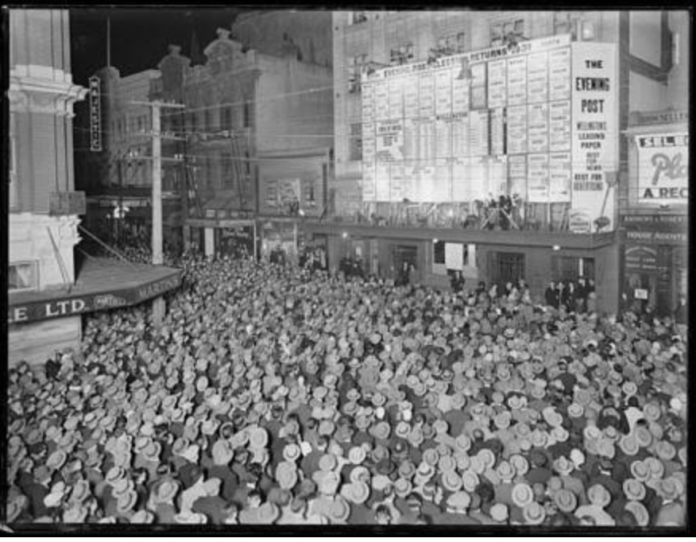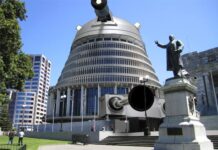
The face of New Zealand and democracy has changed dramatically in the past few years and we need to reflect New Zealand’s new identity and democracy in our main media entities.
Willie Jackson, NZ Herald, 5 July 2022.
HAS NEW ZEALAND’S DEMOCRACY really “changed dramatically” in the past few years? I suppose it all depends on how you define “democracy”, “dramatically” and “the past few years”. Let’s start from there, and then work on to explore the motivation behind such a bold political assertion.
There are very few countries in the world that can boast a continuous democracy as old as New Zealand’s. Our population became fully enfranchised in 1893 when the Liberal Government extended voting rights to women. The United States would not reach that democratic milestone until 1920, and women would not be fully enfranchised in the United Kingdom until 1930. If one of the key indicators of a democratic nation is the right of its people to vote in fair and regular elections, then New Zealand can hold its head high.
Another feature of a working democratic system is whether the will of the majority of voters is reflected in the character and composition of their government. In this regard, New Zealand’s record is less exemplary. Since the acquisition of self-government in 1852, New Zealand has experimented with a number of electoral systems.
The “Two Round System”, for example, pitted the two highest polling candidates of an initial open round of voting against each other in a second run-off ballot. It was designed to ensure that, ultimately, a Member of Parliament represented a true majority of the electors. It lasted from 1908 until 1914. Others, like the system which featured the “Country Quota”, were intended to weight the votes of electors living in rural areas more heavily than those of urban voters. This blatantly anti-socialist measure lasted from 1881 until 1945!
Underpinning both of these reforms, however, was the electoral system known as “First-Past-The-Post (FPP). To win an FPP election it was necessary for a candidate to win more votes than any of his/her rivals. Not more votes than all the votes of his/her competitors combined, you understand, but just a simple plurality. The candidate with the mostvotes (which may, or may not, have constituted a majority of the votes) won.
Obviously, FPP can easily lead to a situation in which the governing party was able to win a majority of parliamentary seats with considerably fewer than half the votes cast. In an election where three or four parties of roughly equal strength are seeking the electors’ support, the outcome is not Majority Rule, but the rule of the most popular minority. Since it is clearly unhelpful, in terms of preserving political legitimacy, to have a clear majority of voters feeling unrepresented, the grim arithmetical logic of FPP drives the political class inexorably towards a rigid two-party system.
In the 1920s and early-1930s, New Zealand voters had three major parties to choose from: the Reform Party, the Liberal (later the United) Party, and the Labour Party. In no election between 1919 and 1938 did any single political party ever secure more than half the votes cast. FPP notwithstanding, New Zealand only boasted a rough two-party system for five elections (1938, 1943, 1946, 1949, 1951) The Labour/National duopoly was broken in 1954 with the advent of the Social Credit Political League. It would take until 2020 for a single New Zealand political party to, once again, secure more than half of the popular vote.
The switch from FPP to Mixed Member Proportional Representation (MMP) in 1996 was certainly the most dramatic change to New Zealand’s democratic machinery since the National Party abolished the Legislative Council – New Zealand’s unelected (and largely decorative) Upper House of Parliament – in 1950.
New Zealanders voted for MMP in response to what was widely perceived as a lack of democratic political agency. With Labour and National both committed to neoliberal economic and social policies, many New Zealanders felt politically disenfranchised. Voters dreamed of electing Parliaments in which heterogeneous assemblages of genuine representatives would enable the formation of governments much more closely attuned to the people’s will.
Their hopes were not fulfilled. MMP certainly allowed political parties to select candidates more reflective of the gender, ethnic and sexual-preference makeup of the New Zealand population, but the House of Representatives remained dominated by National and Labour. Those smaller parties that managed to make it into Parliament dutifully lined-up with one or other of the two major parties in coalitions that only very rarely produced anything even remotely challenging of the neoliberal status quo.
Regardless of the drama, or lack of it, it would seem that, over the course of the last 100 years, the more that New Zealand’s democratic rules have been changed, the more its fundamental political impulses have remained the same. It is, however, possible to make one important observation: the larger the winning party’s share of the popular vote (now known as the Party Vote) the more permanent its subsequent alterations to the country’s face tended to be.
The problem, of course, is that these alterations are all-too-often executed without a mandate. The last time a political party sought, and got, a decisive electoral mandate to change the face of New Zealand it was 1972. (Some might say 1938!) Certainly, over the past 35 years, the biggest and most alarming instances of facial surgery (Rogernomics, Ruthanasia) have been accomplished without the patient’s informed consent – or an anaesthetist!
It is to be hoped that Willie Jackson’s use of the past tense when describing the dramatic changes to the face of New Zealand democracy is inadvertent. It is certainly difficult to make a case for the will of the majority of New Zealanders being any easier to impose today than it was 30 years ago. The “tyranny of the majority” that Willie complains of finds no confirmation in our political history: neither in the Pakeha world, nor Te Ao Māori.
The truly scary thought is that Willie sees the obstacles to achieving effective democratic majorities as a feature, not a bug, of our present system. If his idea of a new and improved New Zealand democracy is one in which, once again, the most determined minorities get to rule, then the change he is describing is not so much an uplifting electoral drama, as a political sucker-punch to the face.





Nice History
Prior to the Lange regime, New Zealand governments somewhat represented the will of the people and defended their interests. Since then, nothing.
Did you miss the Muldoon years?
When the government wasn’t openly destroying public property? No, I’m quite aware of the difference between Muldoon and crooks like Lange and Key who sold off our assets.
Key was elected on a platform that included selling off part of our electricity infrastructure. So regardless of whether you like it or not, it was done in an open and democratic manner, (My Mercury shares have done quite well thanks) and the subsequent Labour government did nothing to revert it back to public ownership.
You are absolutely right, Andrew. I stand corrected.
Yes, Ardern is similarly crooked.
Should the word “co-governance” been explored, or even mentioned.
I think he means more Maori commentators, journalists and TV presenters to reflect our new co-governance identity.
orbital panda – Yes, I he could be talking about the optics or mechanics of assumed co-governance, but it is by no means clear quite what our “ new identify “ is – I doubt that he’s spelling out our confirmed status as USA lapdog. In any case it looks like more social engineering with the back-room boys’ usual lack of transparency – another new norm.
Keep Willie Jackson involved and Labours popularity will collapse.
Shane Jones, managed to kill NZ First pretty fast. A record.
Hit it on the head with “the most determined minorities” to rule.
But maybe the most determined minorities are actually the most powerful and more likely hiding behind business entities.
ANZ NZ profit up 44 per cent to $1.92 billion
https://www.nzherald.co.nz/business/anz-nz-profit-up-44-per-cent-to-192-billion/M5HZNIGQOGZUQPKNKBW3MSVY5E/
Is ANZ Bank a wonderful corporate citizen who should be advising on government policy – maybe they should get their own business in order?
ANZ fined $10 million for fees charged to customers
https://fxnewsgroup.com/forex-news/regulatory/anz-fined-10-million-for-fees-charged-to-customers/
Commission obtains a further $29.4 million for ANZ customers after responsible lending breach
https://comcom.govt.nz/news-and-media/media-releases/2020/commission-obtains-a-further-$29.4-million-for-anz-customers-after-responsible-lending-breach
ANZ fined $280,000 by High Court for misleading customers over credit card insurance policies
https://www.nzherald.co.nz/business/anz-fined-280000-by-high-court-for-misleading-customers-over-credit-card-insurance-policies/KIQOYGJNOBWTDM6MHJ6Y324YCY/
Trial for trio accused of laundering dirty money through ANZ and structuring transactions
https://www.nzherald.co.nz/business/trial-for-trio-accused-of-laundering-dirty-money-through-anz-and-structuring-transactions/7CTXSL7FPECWASYXLK3CJADURA/
Sir John Key sold beach house to exiting ANZ boss David Hisco: ‘It was a transparent issue’
https://www.stuff.co.nz/business/113553059/key-sold-beach-house-to-hisco-it-was-a-transparent-isue
Panama Papers ‘whistleblower’ issues statement, hits out at NZ Prime Minister John Key over Cook Islands; Says income inequality one of the defining issues of our time
https://www.interest.co.nz/news/81460/panama-papers-whistleblower-issues-statement-hits-out-nz-prime-minister-john-key-over
Former PM Sir John and his wife Bronagh sold the Parnell mansion for $23.5 million in 2017 to a buyer reportedly out of China, but neighbours have said they were yet to see anyone move in since the sale.
https://www.nzherald.co.nz/nz/sir-john-keys-former-parnell-mega-mansion-sits-empty-and-neglected/JILMLPHL2BGZJTBD5CQ7NHAG5E/
We look at the ANZ Bank leader for example wanting NZ to ‘loosen immigration’ further in her latest speech – without mentioning NZ already the world’s highest amount of NZ new resident visas, being processed with a very low wage/skill criteria, non English speakers, kids and pensioners.
Not only is record loose immigration a massive problem in NZ, but it seems ‘loose immigration’ has now created more people needing skills becoming resident in NZ and thus the skills shortages worse!
But record immigration adds to ANZ Bank profits.
Bravo on identifying the immigration “scam”.
How easy is it to ‘buy’ political policy in NZ. Seems like, it is very easy.
Chinese businessman Yikun Zhang’s donations go beyond Simon Bridges
https://www.stuff.co.nz/business/money/107902444/auckland-and-southland-mayors-receive-handouts-from-chinese-businessman-yikun-zhang
Southland mayor in China with ‘$100k donor’
https://www.odt.co.nz/regions/southland/southland-mayor-china-100k-donor
Remember in the National party – “Two Chinese would be nice, but would it be one Chinese or one Filipino, or one – what do we do?
JLR: Two Chinese would be more valuable than two Indians, I have to say.”
https://thespinoff.co.nz/politics/17-10-2018/the-jami-lee-tapes-a-transcript-of-the-ross-and-bridges-donation-chat
Conflict of interest concerns over lobbyist turned chief of Jacinda Ardern’s staff
https://thespinoff.co.nz/politics/22-02-2018/conflict-of-interest-concerns-over-lobbyist-turned-chief-of-jacinda-arderns-staff
Labour Party donations case: Suppression lapses for three defendants
https://www.rnz.co.nz/news/political/462209/labour-party-donations-case-suppression-lapses-for-three-defendants
Four out of every five dollars donated to big parties in secret, sparking new push for transparency
https://www.stuff.co.nz/national/politics/95945991/new-push-for-transparency-with-four-out-of-every-five-dollars-donated-to-big-parties-given-secretly?rm=m
Fishing company Talley’s bankrolling Shane Jones’ NZ First campaign
https://www.stuff.co.nz/national/politics/96106426/fishing-company-talleys-bankrolling-shane-jones-nz-first-campaign
Agree Chris, lots wrong with what we have and we need to find a way to stop the government from making wholesale changes without a mandate as has happened repeatedly throughout the years. And to make our government more representative particularly at local level. The strengthening democracy bill should have been about just that by limiting overreach, instead of trying to tip the balance toward one side.
Democracy is messy, fragile and slow but despite Willie and Co’s rhetoric, no system is better than equal suffrage.
That sounds definite Fantail. ‘No’ system is better. What about different groups piloting an idea through Parliament (as MPs can do_ and getting a small budget to trial a system or idea which is monitored and explained as it happens and in a summary later? If we could just get on with something that parties feel constrained to introduce for some reason, then we could get along with life. Doesn’t actually need a maths master to work that out.
Cannabis could have been dealt with years ago, and some close to addicts would have had to come up with a workable system. Alcohol in supermarkets. In its place alcohol good, in measured amounts. But controls on it are always stretched like elastic to bursting point. Government likes the money it brings, and loves to point finger at degenerates who can’t cope when left to self-control. Freedom! To kill yourself slowly and debase all your close relationships.
Everything shouldn’t be left to Parliament. There are faults in politicians, economics laws, administrators objective considerations which are open to question, business at cross-purposes balancing self-interest and profit and market share with appearing to have reliable expert consideration.
I take your point GW but dont forget we pay tons to experts, civil servants and working groups so that the Govt can make good decisions for NZ. Then it is their job to convince the majority and that’s what they earn their money for. (Although, you could be forgiven for thinking that they dont believe that is what they are there for. They appear to think they are there to promote particular ideologies and to get re-elected).
The other part of your comment about just get on and do stuff is kind of correlated with what I meant by more local delivery/democracy. For example why shouldnt the Waikato region for example work on and deliver solutions locally without it having to go through central government. If we did this more, we would get more ‘horses for courses’ solutions – Maori and Pacifica solutions in Porirua and Conservative solutions in Southland. Then by and large, more people are happy and because it is done piecemeal, the stand out solutions rise to the top and people in other areas start pressuring their areas to adopt similar systems. It would also get us away from the competing interests and Left/Right focus we have now especially if we could achieve only non aligned representatives eg: None of this BS that says you must toe the party line and only do what they tell you to.
Our Council for example is really good. Operates on the smell of an oily rag. Always effective and we have had virtually no rate increases for several years. They come to us every so often and say we have X amount of money to be invested in something extra (like a new facility or park) and then give 3 options and their costs. Then they ask you to vote online or similar. I’d love to see them run more services like primary health care, aged care or policing for example.
Labour’s idea of democracy is doing a bunch of reviews but thats as far as that goes, actually doing something with those reviews is an entirely different matter. But they pretend to be democratic by doing just the review and who cares what voters actually want
National and Act eating more popcorn and loving the show…”Yes please, more of Willy Jackson, more of Mahuta, more Sepuloni, more David Clark…please please don’t stop Labour. Let’s have more cowbell!!!” Oh boy, so much to undo…
I am just so looking forward to Adern’s concession speech. God save the Queen.
Roge and Ruth. With his family history he must know the slime of his twinage with her. But the truth is he is a twit. Why no one goes back to him.
Saw the prick in the mid 2000 naught’s parliament, beside a right -wing German visitor. She wasn’t impressed by my explanation and left me like her German group gave her an equally wide passage. Roge was intent on his cellphone but looked up at me intently, like I mattered. I had more hair.
Majority rule has brought so much to the ‘developed’ nations and ‘division of powers’ has destroyed America.
LINO is doing just fine as they are.
Let them continue on their current heading toward to the political abyss and beyond.